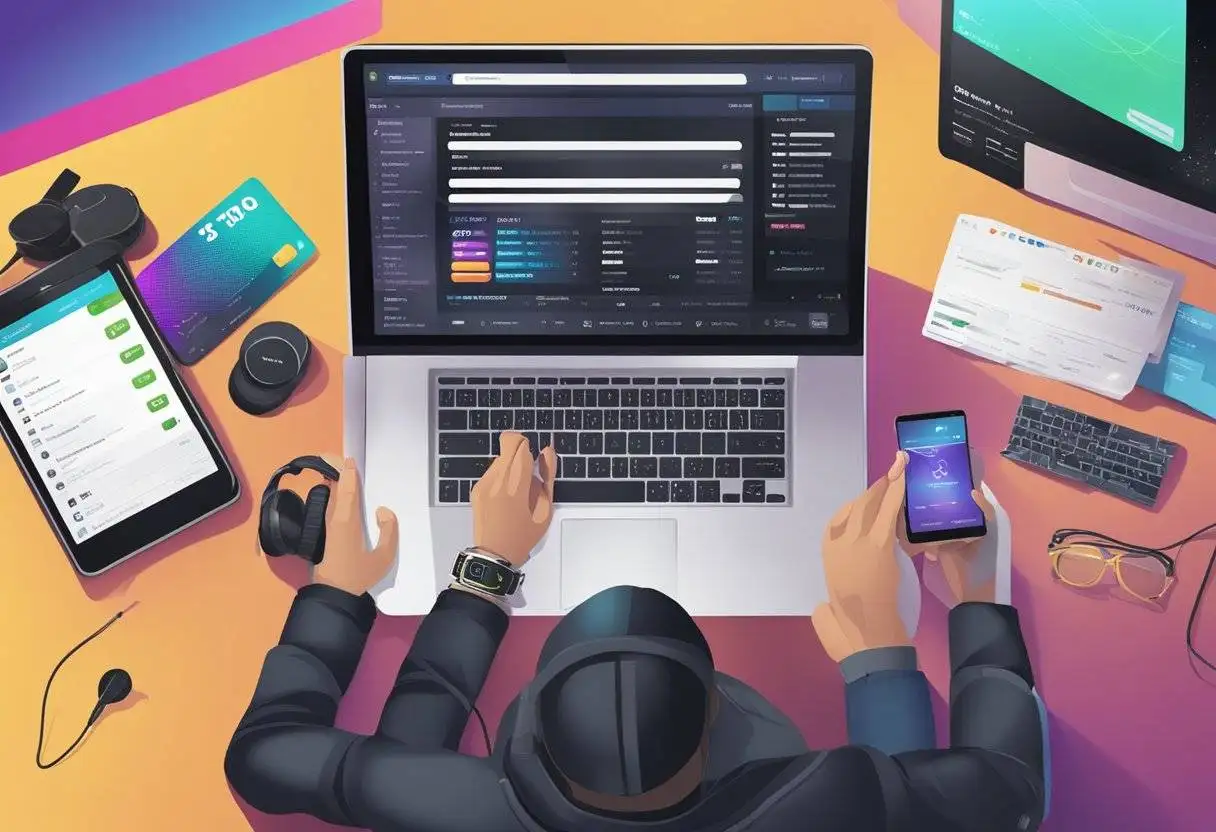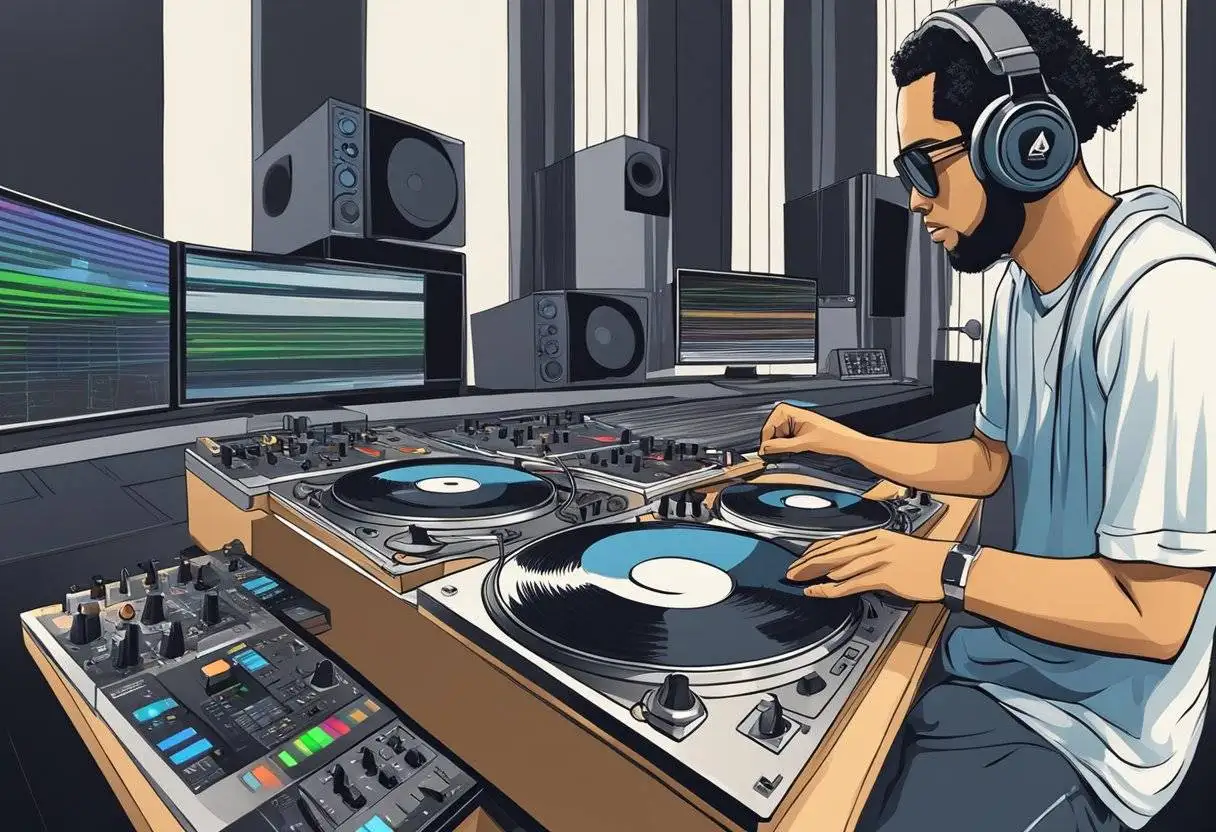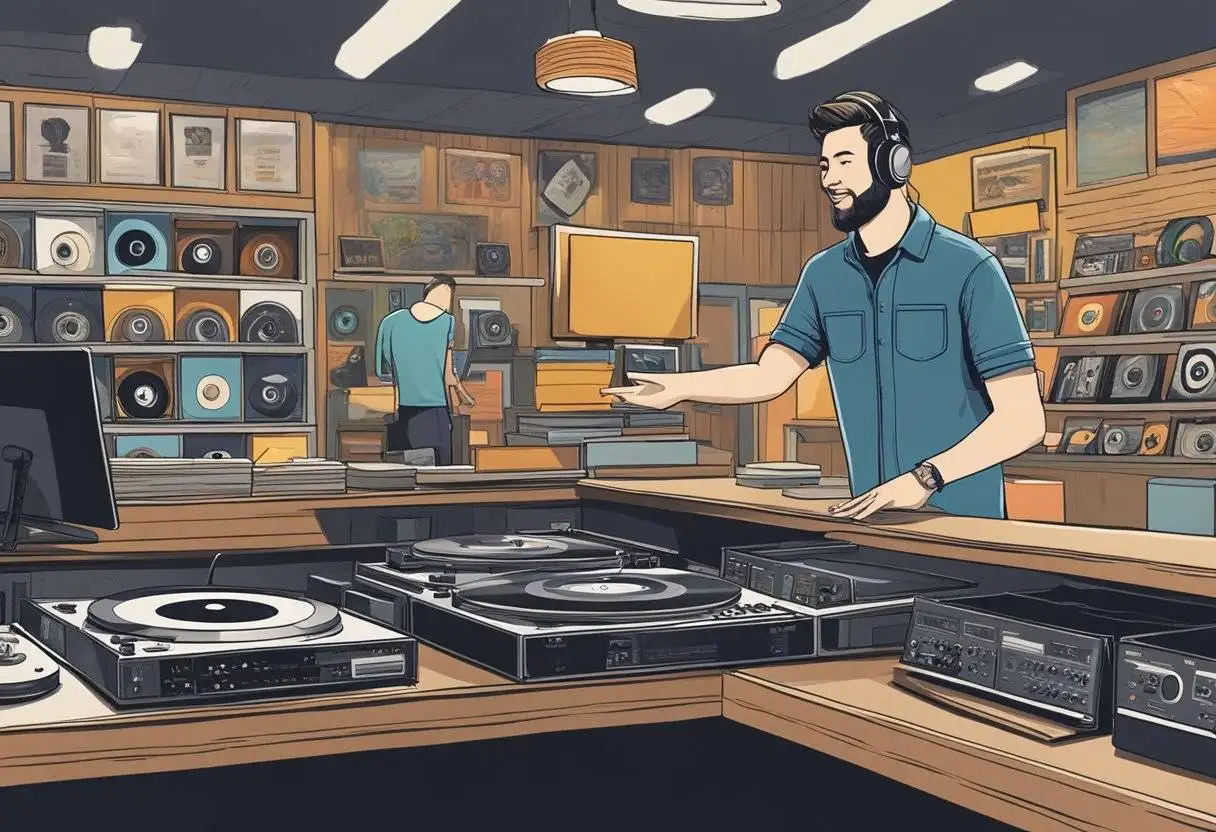In the world of DJing, music is the currency that fuels every performance. As a DJ, a significant aspect of my job involves curating a collection of tracks that not only resonates with my audience but also aligns with my artistic style. However, there is a common question that arises: do DJs have to buy their music? The answer involves understanding the legal and ethical considerations of playing music professionally.

Buying music is essential for obtaining high-quality tracks and supporting the artists and music industry. While some DJs may use subscription services or free tracks provided by artists, purchasing music often entails receiving the necessary licenses to play the songs in public venues. Following these protocols not only safeguards my performances against legal issues but also ensures the creators are compensated for their work.
Key Takeaways
- Acquiring music legally is crucial for DJs to operate within ethical and legal bounds.
- High-quality audio files are typically obtained through purchase or licensing.
- Effective music library management is key to successful DJ performances.
Legal Aspects of Music Procurement

When discussing the legalities of music procurement for DJs, understanding the framework of copyright laws, licensing requirements, and the permissible sources for music acquisition is crucial. Ensuring compliance not only prevents potential legal issues but also respects the rights of creators.
Understanding Copyright Laws
Copyright laws protect the intellectual property of artists and producers ensuring that their work isn’t used without permission. As a DJ, I need to be aware that the tracks, samples, or remixes I use are protected by law globally, with organizations like BMI, ASCAP, and SESAC overseeing the rights in the US, and similar bodies operating in the UK and other regions.
Licensing and Royalty Obligations
To play music publicly, DJs must adhere to licensing and royalty obligations. This usually means securing a digital license for the tracks or a broader license that covers a variety of music. These licenses ensure that royalties are paid to the rights holders, and failure to comply can lead to legal repercussions.
Sources for Legally Acquiring Music
I can legally obtain music from several sources such as Beatport, iTunes, and Amazon Music. Subscription services or record pools like DJCity, BPM Supreme, Digital DJ Pool, and ZipDJ offer a vast library of tracks where a single subscription covers the licensing for public play.
Consequences of Illegal Music Use
The use of music without proper licensing can lead to lawsuits and significant fines. As a DJ, unauthorized use of copyrighted music could damage my reputation and result in financial liability to the record labels and artists whose music I played without permission.
DJing and Music Rights in Different Regions
Music rights and licensing can vary by region. For example, the copyright laws in the US may differ from those in the UK, hence it’s essential for me to know the specific regulations of the area where I am performing.
Streaming Platforms and DJ Usage
Some streaming platforms like Spotify, SoundCloud Go+, YouTube Music, and Tidal offer services tailored for DJs, such as Beatport Link, which provides access to tracks within DJ software. It’s vital for me to ensure that my use of these platforms complies with their terms of service, which usually involve additional licensing agreements.
Sourcing Quality Music for DJing
When building a DJ repertoire, it’s crucial to source quality music that not only resonates with audiences but also respects the legality and ethics of music consumption. I understand the need to ensure a rich collection that ranges across different sources for flexibility and depth.
Online Music Stores and Marketplaces
In my experience, online music stores like Beatport and Traxsource are essential for DJs who seek the latest electronic music tracks. These platforms provide high-quality files, often in WAV or AIFF formats, which are crucial for the best sound in clubs and festivals.
- Beatport: A go-to for electronic tracks.
- Traxsource: Catered towards house music lovers.
Record Pools and DJ Exclusive Content
For me, record pools like BPM Supreme and Digital DJ Pool have been invaluable. They offer a subscription service granting access to a wide array of remixes and exclusive content tailored for DJs.
- DJCity: Known for hip-hop and urban tracks.
- Club Killers: Focused on party and club remixes.
Physical Formats and Their Relevance
Despite the digital shift, I still find value in collecting physical formats such as vinyl records and CDs. They’re not only tangible pieces of music history but also provide a unique sound warmth that digital files may lack.
- Vinyl: Provides a richer sound experience.
- CDs: Serve as a tangible backup.
Digital Platforms and Downloads
Digital platforms also play a key role. For added convenience, I often turn to services like iTunes and Amazon Music for purchasing digital music. They offer a vast selection of mainstream tracks and albums in digital format, making music acquisition instant and straightforward.
- iTunes: Widespread selection of mainstream music.
- Amazon Music: Accessible and user-friendly.
Emerging Artist Hubs and Discovering New Music
Finally, sites like Soundcloud and Bandcamp have been integral for me in discovering new music and emerging artists. These platforms allow independent producers to share their music directly with fans, often including free or name-your-price downloads.
- Soundcloud: A plethora of undiscovered talent.
- Bandcamp: Supports direct artist support.
Optimizing Music Selection and Library Management
In my approach to DJing, it’s essential to meticulously select tracks and manage my music library to ensure a smooth performance. Let’s explore the specifics of building a powerful music arsenal.
Building and Organizing a DJ Music Library
I start by sourcing high-quality tracks, ensuring my collection spans across various genres to accommodate different gigs. Tools like Rekordbox and Serato aid in managing my digital music effectively, allowing for sorting by genre, mood, and other criteria.
Creating Playlists and Setting BPM
Playlists are the backbone of my DJ set, structured to guide the energy on the dance floor. I sort each list by BPM and key to craft seamless transitions, keeping the crowd engaged. Curated playlists for different genres and events ensure I’m always prepared.
Utilizing Edits and Remixes
To make my sets stand out, I incorporate unique edits and remixes, altering tracks to fit the set’s tempo or to surprise the audience. Sometimes, these custom versions become the highlight of the night.
Free Music and Legal Alternatives
Exploring free music alternatives is a route every DJ considers. Sites like SoundCloud provide tracks that can be legally downloaded. However, I am always mindful of copyright laws and ensure all my tracks are obtained legitimately, whether free or purchased.
Engagement and Feedback Through Social Media
Lastly, social media serves as a two-way channel between me and my audience. I post snippets of my sets, seek overall feedback, and gauge exposure. This interaction often guides future music choices and helps me to understand what resonates with my listeners.
Strategies for DJ Performances

In my years as a DJ, I’ve learned that success hinges on meticulously choosing your music and leveraging cutting-edge tools to deliver an exceptional experience. Each event I play has unique demands, from the venue to the audience, and I tailor my performances accordingly.
Selecting Tracks for Specific Venues and Events
When I’m booked for a performance, the first thing I do is consider the venue and event type. Clubs with a reputation for techno won’t appreciate a sudden swing into country, and vice versa. I meticulously curate tracks that complement the venue’s atmosphere, ensuring my set resonates with the regular clientele and the specific audience of the event.
Crafting Dynamic Sets for Diverse Audiences
My sets are never static; they’re like a live organism, constantly evolving to match the audience’s energy. I read the room, switching genres or tempo to maintain engagement. Whether it’s slowly building up the mood at a lounge or jumping into high-energy beats at a peak club hour, I focus on crafting a dynamic musical journey.
DJ Equipment and Streaming Integration
Staying on the cutting edge of technology, I integrate the latest DJ equipment with preferred streaming platforms. This harmony allows for seamless transitions and a plethora of options at my fingertips. Whether it’s a tried-and-tested turntable setup or a controller synced with a streaming service, I ensure my setup is reliable and conducive to a spectacular performance.
Utilizing DJ Pools and Exclusive Content during Sets
I maintain memberships with several DJ pools to access unique and exclusive content. These pools are invaluable for distinguishing my sets with tracks that can’t be easily found on commercial platforms. Record pools often offer clean, extended, or remixed versions that give my live performances a distinct edge.
Frequently Asked Questions

In my experience as a DJ, there are some common inquiries about the business side of DJing, particularly about music acquisition and legalities. Here, I address these important questions to clarify misunderstandings and provide reliable insights.
Are DJs required to pay royalties for playing music at events?
Yes, typically when I play music at events, I need to ensure royalties are covered. This is often handled through a performance rights organization that collects fees and distributes royalties to the composers, artists, and publishers.
Can DJs create and use their own music for performances?
Absolutely. As a DJ, I can create my own tracks and perform them without worrying about the additional licensing issues that come with playing other artists’ music. It allows for a unique set that’s entirely original.
What are some reputable sources where DJs can purchase their tracks?
There are multiple platforms where I buy my music, such as Beatport, Traxsource, and Juno Download. Purchasing from these reputable sources ensures that I receive high-quality tracks and that the artists are properly compensated.
How does a DJ license affect a DJ’s use of music?
A DJ license allows me to legally play copyrighted music to the public. Depending on my location, the specific requirements can vary, but this license is crucial to comply with copyright law and avoid legal issues.
Is it possible for DJs to find and use free music legally, and if so, where?
Yes, I can legally obtain free music through websites that offer royalty-free tracks or from artists who release their music with a creative commons license. However, I always verify the terms of use to ensure compliance with the law.
What legal considerations do DJs face when compiling music for their sets?
When I compile music for my sets, I must consider copyright law, which requires me to have permission to play recorded music in public. Purchasing music, obtaining licenses, and respecting the terms of use of any tracks are the main legal aspects I manage as a DJ.
